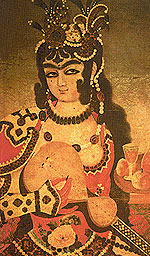|  In
terms of variety and geographic range, string instruments
occupy an exceptional place in Azerbaijani musical
culture. There are various legends recorded in written
sources about the appearance of string instruments.
According to one legend, the guts of an animal that
had been torn to pieces by an eagle fell out and hung
from tree branches. After some time, the guts, which
had dried and stretched over the branches, began to
produce various musical tones caused by the wind. In
terms of variety and geographic range, string instruments
occupy an exceptional place in Azerbaijani musical
culture. There are various legends recorded in written
sources about the appearance of string instruments.
According to one legend, the guts of an animal that
had been torn to pieces by an eagle fell out and hung
from tree branches. After some time, the guts, which
had dried and stretched over the branches, began to
produce various musical tones caused by the wind.
This supposedly prompted ancient people to invent
string instruments. One part of this legend is verifiable:
we do know that the strings and frets of early instruments
were made of animal gut, and that the body, neck and
head were made of wood.
Numerous string instruments have passed through centuries
of evolution and survived until the present, often
having an impact on the creation of new instruments.
Azerbaijani string instruments are divided
into four types according to the way they are performed:
1. Instruments played with a plectrum-tar, saz, ud,
canun, barbat, rud, rubab, gopuz and choghur
2. Instruments played with a bow-kamancha and chagane
3. Instruments played with the fingers-chang and Shirvan
tanbur
4. Percussion string instrument-santur
.
|